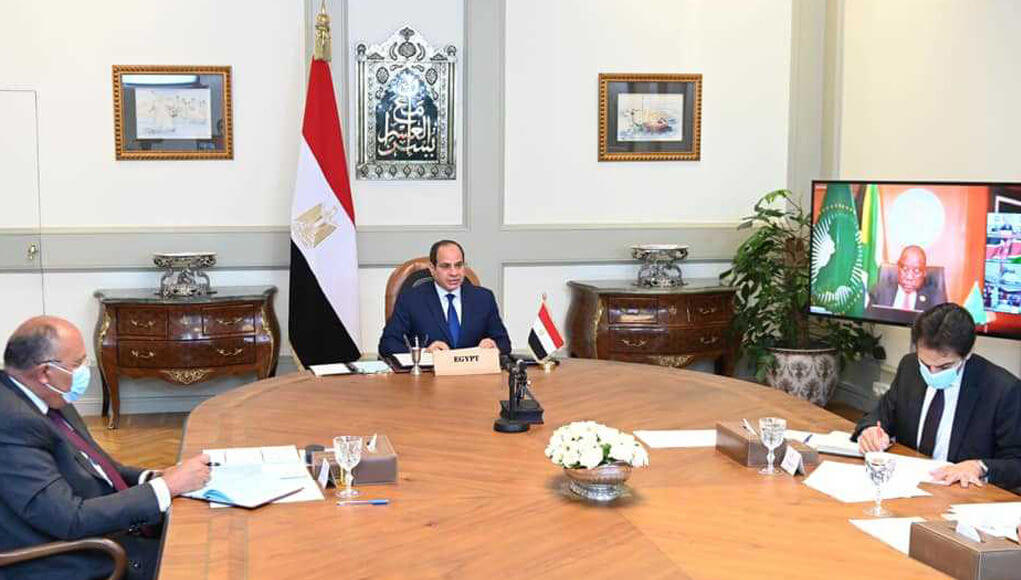Egypt, Sudan and Ethiopia agreed, on Friday, to postpone filling the Renaissance Dam, until a final legal agreement binding on all parties regarding the rules for filling and operating the Ethiopian Renaissance Dam is reached.
The decision came after the convening of an African summit under the auspices of South African President Cyril Ramovosa, who met with Egyptian President Abdel Fattah El-Sisi, Sudanese Prime Minister Abdullah Hamdock and Ethiopian Prime Minister Abi Ahmed, through video conferencing technology.
Participants in the meeting decided to refrain from taking any unilateral measures, including filling the dam before reaching an agreement, besides sending a letter in this context to the Security Council as the competent authority, to take it into consideration when holding its session to discuss the issue of the Renaissance Dam next Monday.
The attendees also agreed to form a governmental committee of legal experts and technicians from the three countries, Egypt, Sudan and Ethiopia, in addition to the African countries that are members of the Presidency of the African Union, as well as representatives of international bodies monitoring the negotiation process, with the aim of completing the elaboration of the legal agreement.
The meeting was attended by heads of the four countries, along with the President of the Democratic Republic of the Congo Felix Tshisekedi, the Prime Minister of Mali, Ibrahim Boubakeur Kita, and the Chairperson of the African Union Commission, Moussa Faki.
The summit started with an opening welcoming speech from South African President Cyril Ramovosa, followed by a speech by Hamduk in which he talked about the need to reach an agreement that preserves the interests of the three countries, stressing that Sudan is not a neutral mediator, but it is a genuine party to the Renaissance Dam issue.
Hamdok asserted that Sudan is the biggest beneficiary of the Renaissance Dam, as it will be the biggest affected in the event of risks, and therefore he urges Egypt and Ethiopia on the need for an urgent return to negotiation and an African will to reach an understanding on the issue.
All speakers affirmed that the previous negotiations had resolved between 90% and 95% of the issues, and that little remained to be achieved thanks to the availability of will and determination.
For his part, Al-Sisi said that Egypt is open with a sincere desire to reach a fair and balanced agreement on the Renaissance Dam, in a way that enables Ethiopia to achieve the economic development that it aspires to and increase its capabilities to generate the electricity it needs, taking into account the interests of the downstream countries of Egypt and Sudan and not to cause harm To their water rights.
The huge Renaissance Dam project on the Blue Nile, which Ethiopia launched in 2011, is a source of regional tension, especially with Egypt, which the Nile supplies 90 percent of its water needs, and is already suffering from water scarcity even before filling the dam.
https://easternherald.com/war/egypt-ethiopia-renaissance-dam-war-66745/
After the meetings and negotiations sponsored by Washington, which stopped in mid-February, have reached 90 percent on the outstanding issues about the dam, Ethiopia has returned “to reject everything agreed upon as if we were back to square one,” according to a research paper published by Ayman Shabana, Director of the African Research Center at Cairo University on the Renaissance Dam.
The three countries were expected to conclude an agreement in Washington at the end of February regarding the filling and operation of the dam, but Ethiopia failed to meet and Egypt only signed it first.














